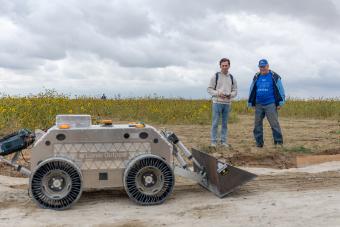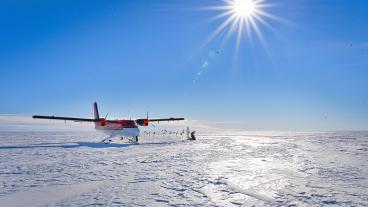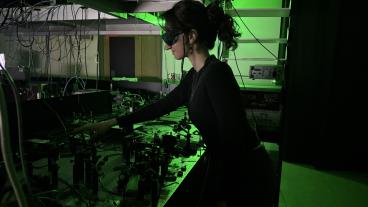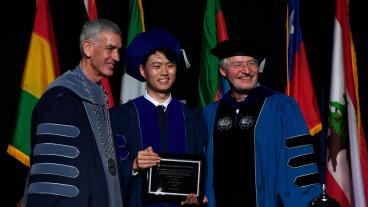Mines, Lunar Outpost team heading to finals in NASA’s Break the Ice Challenge
The Ice Diggers are one of six teams named finalists in NASA competition

A team with members from Colorado School of Mines and Lunar Outpost, called the Ice Diggers, has been named a finalist in NASA’s Break the Ice Lunar Challenge.
The Ice Diggers will be one of six teams facing off head-to-head this spring at a NASA-designed test facility to see which prototype lunar excavation rover performs best. The prototype systems will be put to the test by excavating under reduced gravity – using gravity off-loading – and transportation over complex terrain, including rocks, craters, slopes, turns and loose granular soil.
On the line is $1.5 million in cash prizes, split between the first and second place teams, as well as the opportunity to test their concepts at one of NASA’s Thermal Vacuum Chambers, which can simulate the temperature and atmospheric pressure conditions at the Lunar South Pole.
“Having technology that allows us to excavate and transport the water ice on the Moon could change space travel forever,” said George Sowers, professor of practice in space resources at Mines and team leader. “After years of hard work, we’re excited to bring our prototype to the campus of Alabama A&M in Huntsville to see how it stacks up head-to-head against the other five finalists.”
Launched in November 2020, the Break the Ice Lunar Challenge tasked competitors with creating robotic systems that can traverse the volatile terrain of the Lunar South Pole. These rovers have to be able to dig regolith – the dusty, icy “dirt” from the Moon’s surface – and transport it to a secondary location for in-situ resource utilization (ISRU) processing.
Phase 1 of the competition, where teams submitted proposals for systems designs to achieve goals related to excavation, travel and delivery, saw 13 teams chosen for cash prizes and advancement to the next round. The Mines team finished in second place. Phase 2: Level 1 opened in June 2022, with Phase 1 winners and some newcomers developing their designs into prototypes. Ultimately, 13 semi finalists received a share of a $500,000 prize and moved on in the competition, including the Ice Diggers team.
Phase 2: Level 2 challenged the semifinalist pool – which consisted of garage inventors, academics, industry professionals and hobbyists from 11 U.S. states, the Netherlands and India – to demonstrate their prototypes. Systems were tested over 15 days at various testing sites. The Ice Diggers tested their lunar excavation rover at Colorado Air and Space Port beginning on Sept. 9. During the challenge, the team’s excavation system extracted over 12 metric tons of concrete, exceeding NASA’s requirements each day. The highest placing teams from this phase were named finalists.
The Ice Diggers placed third in the semifinals to earn their spot in the finals and $125,000.
The Break the Ice Lunar Challenge is a NASA Centennial Challenge led by the agency’s Marshall Space Flight Center in Huntsville, Alabama, with support from NASA’s Kennedy Space Center in Florida.




